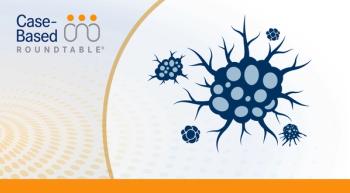
Recommendations for Treating Central Nervous System Cancers
In season 4, episode 10 of Targeted Talks, Craig Horbinski, MD, PhD, reviews the clinical practice guidelines for central nervous system cancers.
In season 4, episode 10 of Targeted Talks, Craig Horbinski, MD, PhD, director of neuropathology in the Department of Pathology, and professor of pathology, neurological surgery, and neuropathology, Feinberg School of Medicine at Northwestern University, reviews the clinical guidelines for central nervous system (CNS) cancers. This tumor type includes glioma, intracranial and spinal ependymomas, medulloblastoma, limited and extensive brain metastases, leptomeningeal metastases, non-AIDS-related primary CNS lymphomas, metastatic spine tumors, meningiomas, and primary spinal cord tumors.
In 2022, the National Comprehensive Cancer Network (NCCN) published an update to its Clinical Practice Guidelines for Central Nervous System Cancers (NCCN Guidelines). Horbinski explains that in the guidelines, there are important recommendations for screening of patients with gliomas and identifying key disease features.
“The first step is diagnosing them. For the community pathologist or community oncologists, the threshold for having a case sent to a tertiary academic center that has this kind of molecular armamentarium available should be kind of low, because we're finding that the more screening we perform, the more interesting things we catch, some of which are targetable. Something that might radically change the prognosis substantially, like glioblastoma or something that was thought to be glioblastoma by methylation profiling might be a pleomorphic xanthoastrocytoma. That radically changes the patient's prognosis and management. That's the first thing, said Horbinski. Then, once the testing is done, integrate it with the histopathology, producing a unifying diagnosis. Based on that, there is a lot of information in the NCCN Guidelines as it concerns specific recommendations, according to what type of tumor [a patient has].
Looking forward in molecular profiling of CNS cancers, Horbinski explains that there is much work to be done. Horbinski foresees advances in the way these tumors are diagnosed and prognosticated. A bigger undertaking, however, will be developing therapeutics that target newly-discovered biomarkers. But Horbinski notes, that there is research ongoing in this area.
“Right now, we're studying DNA modifications. DNA methylation by histone methylation and acetylation might yield even more data on tumor types. But we're talking years and years of research before we can tell what's going to pan out,” says Horbinski.




















